I was late to the Oppenheimer bandwagon. I did not get the chance to see the movie until it was available for streaming. I admit, it would have been amazing to see the film on the big screen, but I was also glad to be able to split the long, 180-minute movie up in two days so that I could really enjoy and focus on the movie. I was happy that I watched the movie before the Academy Awards Ceremony.
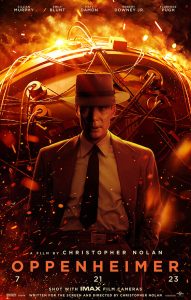 Oppenheimer, a Universal Studios movie directed by Christopher Nolan recently won seven 2024 Academy Awards including Best Picture, Best Director, Best Actor, Best Supporting Actor, and Best Cinematography.
Oppenheimer, a Universal Studios movie directed by Christopher Nolan recently won seven 2024 Academy Awards including Best Picture, Best Director, Best Actor, Best Supporting Actor, and Best Cinematography.
Having what I like to call a generalist librarian’s mind, I enjoy learning about a range of various topics at a shallower level than typical academic research. Watching movies, reading books, or watching shows that are based on true events, time periods, or based on real people, always gets my interest peaked to learn more. How accurate was the show, movie, or book? How close did the piece follow its source material? Was the person/time really as portraited?
Movies and shows also encourage me to learn more and dig deeper into topics. While watching Oppenheimer, I started thinking about the difference between an A-Bomb and an H-Bomb. I wanted to learn more about the effects of the bombs on Hiroshima and Nagasaki. I thought about how the “test” of the bomb was actually the first atomic bomb instance and wondered the effects it had on the land. I also wanted to learn more about the women and other people involved in the Manhattan Project since the movie so closely focused on Robert Oppenheimer that the other characters were only shown in relation to him and were not fully fleshed characters.
This blog is not meant to be an in-depth analysis of the movie but more of a small overview of the resources available at the History, Philosophy, and Newspaper Library. I had been struggling on determining my topic for this blog until after I saw the movie. I came in to work and was not surprised, but happy to find that HPNL had books, microfilm, and digital resources on the topic. Not only did I find new books in our collection, I was also able to check out the book that provided the source material for the film:
Bird, Kai, and Martin J. Sherwin. American Prometheus : The Triumph and Tragedy of J. Robert Oppenheimer. A.A. Knopf, 2005.
From the back cover: “J. Robert Oppenheimer is one of the iconic figures of the twentieth century, a brilliant physicist who led the effort to build the atomic bomb for his country in a time of war,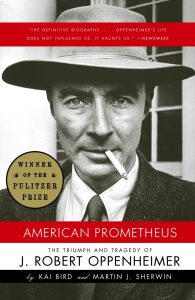 and who later found himself confronting the moral consequences of scientific progress. In this magisterial, acclaimed biography twenty-five years in the making, Kai Bird and Martin Sherwin capture Oppenheimer’s life and time, from his early career to his central role in the Cold War. This is biography and history at its finest, riveting, and deeply informative.”
and who later found himself confronting the moral consequences of scientific progress. In this magisterial, acclaimed biography twenty-five years in the making, Kai Bird and Martin Sherwin capture Oppenheimer’s life and time, from his early career to his central role in the Cold War. This is biography and history at its finest, riveting, and deeply informative.”
While reading this book, I was impressed with the level of detail and research that went into the book. The book is 721 pages and includes extensive notes, bibliography, and index. It was written by Martin Sherwin, a historian at Tufts University and Kai Bird, a journalist. Sherwin researched J. Robert Oppenheimer for over fifteen years to write the book and the authors utilized over thirty collections of archives and oral interviews with Oppenheim’s family members, friends, and colleagues to collect the information. The book was well received and even won a Pulitzer Prize for biographies in 2006.
I was happy to find that the book included and had expanded details about many of the small, nuanced scenes from the movie. It includes more childhood history than the movie and extends all the way to Oppenheimer’s death.
If you would also like to explore the subjects of J. Robert Oppenheimer, the creation of the atomic bomb, or the effects of the bombs dropped during World War II on Los Alamos, Nagasaki, and Hiroshima, the History, Philosophy, and Newspaper Library has the resources to help you begin your research.
HPNL Reading List
Word Document – Oppenheimer Reading List
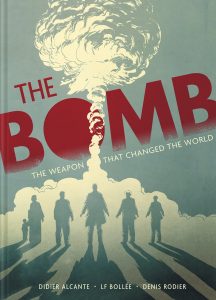 Alcante, et al. The Bomb : The Weapon That Changed the World. Abrams ComicArts, 2023.
Alcante, et al. The Bomb : The Weapon That Changed the World. Abrams ComicArts, 2023.
Alperovitz, Gar., and Sanho. Tree. The Decision to Use the Atomic Bomb and the Architecture of an American Myth. Knopf, 1995.
Banco, Lindsey Michael. The Meanings of J. Robert Oppenheimer. University of Iowa Press, 2016.
Bird, Kai, and Martin J. Sherwin. American Prometheus : The Triumph and Tragedy of J. Robert Oppenheimer. A.A. Knopf, 2005.
Brodie, Janet Farrell. The First Atomic Bomb : The Trinity Site in New Mexico. University of Nebraska Press, 2023.
Cassidy, David C. J. Robert Oppenheimer and the American Century. Pi Press, 2005.
Gordin, Michael D. Five Days in August : How World War II Became a Nuclear War. Princeton University Press, 2007.
Ham, Paul. Hiroshima Nagasaki. Doubleday, 2012.
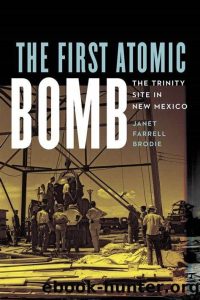 Herken, Gregg. Brotherhood of the Bomb : The Tangled Lives and Loyalties of Robert Oppenheimer, Ernest Lawrence, and Edward Teller. Henry Holt and Co., 2002.
Herken, Gregg. Brotherhood of the Bomb : The Tangled Lives and Loyalties of Robert Oppenheimer, Ernest Lawrence, and Edward Teller. Henry Holt and Co., 2002.
Heuser, Beatrice. The Bomb : Nuclear Weapons in Their Historical, Strategic, and Ethical Context. Longman, 2000.
Hogan, Michael J. Hiroshima in History and Memory. Cambridge University Press, 1996.
Kiernan, Denise. The Girls of Atomic City : The Untold Story of the Women Who Helped Win World War II. Simon & Schuster, 2013.
Kort, Michael. The Columbia Guide to Hiroshima and the Bomb. Columbia University Press, 2007.
Lifton, Robert Jay, and Greg Mitchell. Hiroshima in America : Fifty Years of Denial. Putnam’s Sons, 1995.
Malloy, Sean L. Atomic Tragedy : Henry L. Stimson and the Decision to Use the Bomb against Japan. Cornell University Press, 2008.
Masco, Joseph. The Nuclear Borderlands : The Manhattan Project in Post-Cold War New Mexico. Princeton University Press, 2006.
Minear, Richard H., et al. Hiroshima : Three Witnesses. Princeton University Press, 1990.
Pellegrino, Charles R. To Hell and Back : The Last Train from Hiroshima. Rowman & Littlefield, 2015.
Polenberg, Richard. In the Matter of J. Robert Oppenheimer : The Security Clearance Hearing. Cornell University Press, 2018. 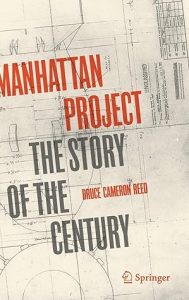
Reed, Bruce Cameron. Manhattan Project : The Story of the Century. Springer, 2020.
Sakamoto, Pamela Rotner. Midnight in Broad Daylight : A Japanese American Family Caught between Two Worlds. Harper, an Imprint of HarperCollins Publishers, 2016.
Southard, Susan. Nagasaki : Life after Nuclear War. Viking, 2015.
Takaki, Ronald T. Hiroshima : Why America Dropped the Atomic Bomb. Little, Brown, and Co., 1995.
Vandemark, Brian. Pandora’s Keepers : Nine Men and the Atomic Bomb. Little, Brown, 2003.
Walker, J. Samuel. Prompt and Utter Destruction : Truman and the Use of Atomic Bombs against Japan. The University of North Carolina Press, 2016.
Zeman, Scott C., and Michael A. Amundson. Atomic Culture : How We Learned to Stop Worrying and Love the Bomb. University Press of Colorado, 2004.